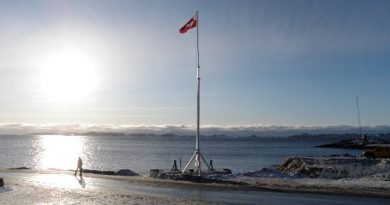Canada’s Northwest Territories needs user-friendly public registry for oil and gas, says MLA

‘[It’s] virtually impossible to get any coherent information on specific oil and gas holdings’
The N.W.T. government does not have a “coherent” public registry detailing who holds an oil and gas licence, or what area a licence covers — and that erodes government transparency, according to Frame Lake MLA Kevin O’Reilly.
It is “virtually impossible to get any coherent information on specific oil and gas holdings,” he said, after raising concerns about a significant discovery licence being issued in the Sahtu without conditions.
“While attempting to drill down into the Husky Oil significant discovery licence, I was astounded at how difficult it is to find any useful or accessible information about how our government actually administers oil and gas rights,” he said.
‘Not user friendly’
There are three separate web pages relating to oil and gas rights and a series of outdated maps that are neither linked nor user-friendly, unlike the database used on the Mackenzie Valley Land and Water Board, O’Reilly said.
Two weeks after the territorial government converted Cenovus Energy’s exploration licence to a significant discovery licence, that information has not been updated online.
O’Reilly said the Petroleum Resources Act requires the issuance of exploration, production and significant discovery licences be published in a timely manner in the Northwest Territories Gazette and on a website maintained by the territorial government.
He argues the websites currently in use are insufficient.
There are a series of web pages detailing monthly oil and gas rights activities, but “no maps, no company names, no actual dates, just a lumping together of licence numbers,” he said.
A second, unlinked page, has listings searchable by company name without data associated such as areas the licences cover or work performed.
Gov’t can ‘do a lot better’
Annual oil and gas reports have “busy” maps but none are linked to the licence or activity listings, he said.
“There is no searchable, user-friendly, integrated public registry for petroleum rights. Surely to goodness, seven years after devolution and 19 months after the transparency provisions were passed in the House to provide stronger accountability in petroleum rights reporting, we can and should be able to do a lot better,” he said.
He said establishing a clear and consolidated public registry that links licences to a mapped location would improve the transparency of how the N.W.T. manages oil and gas resources.
Industry Minister Caroline Wawzonek said the website works for her purposes, but that she’s willing to find opportunities for improvement.
“This issue has come up generally, that [the Department of Industry, Tourism and Investment] website doesn’t provide sufficient transparency to meet the regulations, the legal requirements that we have,” Wawzonek said.
“We want to achieve that. We want to be useful to the public.”
Licence with no conditions the last of its kind
Wawzonek responded to more questions in the Legislative Assembly Wednesday on the issuance of a significant discovery licence to Cenovus Energy on March 16.
She said legal advisors noted the original call for bids and exploration licence documents did not include a rental fee structure, and she’ll stick to that advice.
Wawzonek confirmed that because she does not have the discretion to impose conditions on the company, the licence was issued with no fees or work requirements attached.
But the decision to not impose fees is on a company that existed under the previous region is likely the last of its kind.
It’s “unique … and unlikely to be repeated,” said Wawzonek.
O’Reilly added that the territory’s lands department should be administering sub-surface rights, rather than the industry department, which has the conflicting duty to both regulate and promote resource development.
O’Reilly asked if the legal opinion on Husky can be shared even on a confidential basis, but the minister said that would not be possible.
The call for bids, tabled in the Legislative Assembly said rent may be paid on lands included in a significant discovery licence, but the territory’s legal experts say otherwise.
Related stories from around the North:
Canada: Mining companies in Nunavut, Canada defend environmental management despite stiff criticism, CBC News
Norway: Oslo opens up for big drilling, but oil companies do not want remote Barents licenses, The Independent Barents Observer
Russia: In Russian Arctic energy shift, Novatek might turn from LNG to ammonia, The Independent Barents Observer
Sweden: Green hydrogen plant doing steel production to be built in northern Sweden, The Independent Barents Observer
United States: U.S. court halts drilling at ConocoPhillips project in Alaska, The Associated Press



